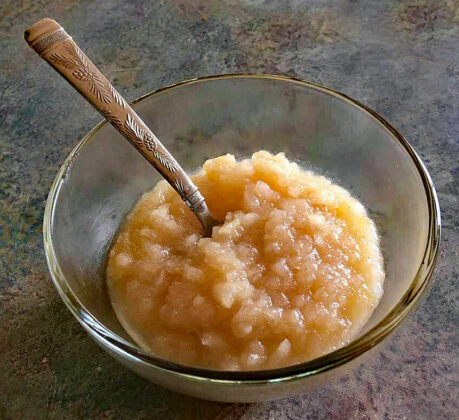
Finally! Apple season is upon us and it’s the only time of year I eat them. There is something very unappealing to me about buying apples year-round in a grocery store. And so, when the time is right, I make my annual pilgrimage to the local orchard. Upon entering the store, I am greeted by the overwhelming aroma of apples and I carefully make my way up and down the rows, showcasing the many different varieties, sampling as I go. I take my time, reveling in this experience and making the most of my visit. Finally, I arrive at my favorite — the only variety I truly enjoy.
Johnny Appleseed
And who do we have to thank for this amazing fruit? Why, Johnny Appleseed, of course. Born as John Chapman on September 26, 1774, in Massachusetts, Johnny was an early horticulturist and conservationist. Around 1800, he began visiting cider presses in western Pennsylvania and collecting the apple seeds that accumulated around them. From here he began his missionary journey westward, planting apple trees as he went for the settlers that would follow in his wake. Stopping in various locations, he would carefully establish nurseries and orchards, fencing them off for protection from livestock. As nearby areas became settled, he would then sell off these parcels to the pioneers. Johhny did not believe in the process of grafting, and the trees that grew from the seeds he germinated produced fruit that was best suited for cider due to its tartness and small size.
Johnny Appleseed owned over 1,200 acres across Pennsylvania, Ohio, Indiana and Illinois, but his time in the Buckeye State was notable, as he began establishing nurseries throughout north-central Ohio. Although the majority of his time in the state was spent in Richland County, near Mansfield, he also established orchards in Knox, Licking, Wayne and Crawford counties. Often, he asked permission from landowners to establish an orchard. As the tiny saplings began to flourish, he would sell them or simply trade them for the supplies that he needed. Often, because of his unselfish nature, he gave the trees away to people who could not afford to purchase them.
Though peculiar in appearance and quirky in nature, Johnny endeared himself to many. He was a frontiersman in the truest sense of the word, complemented by a generous, cheerful personality and love of animals. He had an amazing knowledge of medicinal herbs and traversed the landscape in perfect harmony with the Native Americans. He continued planting orchards, establishing nurseries and educating farmers as he pursued his trek westward finally passing away in 1847 at the age of 72 in Fort Wayne, Indiana.
Here in Ohio, the celebration of his life and legacy lives on through monuments, celebrations and remnant apple orchards which have become living memorials. The annual Johnny Appleseed Festival in Lisbon, Ohio takes place in late September. The Johnny Appleseed Educational Center & Museum in Urbana, Ohio holds the world’s largest collection of memorabilia and information about his life. And the 30-mile Johnny Appleseed Historic Byway in Richland and Ashland Counties includes historical sites such as Johnny’s original landholdings and nurseries.
Macoun apple

I wait all year for my favorite variety of apples to hit the shelves. When I finally bite into its purple skin, the sharp sound of my teeth breaking into the crisp white flesh resonates around me. Juice dribbles down my chin, dripping onto my shirt. This is followed closely by a double explosion of both sweet and tart which sends my taste buds into a frenzy. THAT, my friends, is a Macoun. I eat one at the orchard, and one on the way home. Another after dinner. Before you know it, I have a case of the collywobbles.
Once my initial craving is satisfied, I can slow down and just enjoy, knowing the supply of this variety will be available for the next several months. I search for my apple peeler, which has disappeared into the deep recesses of the cupboard over the past year and commence production of a big batch of homemade applesauce. You know, the chunky kind with lots of cinnamon. And I make a delicious apple crisp, several times, for family and friends. All of these recipes utilize my beloved, versatile Macoun apple. Yet, I’m not the only one here who appreciates this tasty fruit. Our mules, Simon and Tilly, also love a daily slice or two, as do our continental giant rabbits and even our dog, Sadie Mayhem.
I counted 51 varieties of apples listed on a board at the orchard this year. Surely, everyone should be able to find a variety that pleases their palate with so many choices at hand. Every fall, as I sit enjoying a fresh apple, my mind floats back to a time when a quirky-looking, barefoot man with ragged trousers, a metal stew pot coving his long, scraggly hair and a shoulder bag full of apple seeds, roamed the wilderness of this area, spreading his wealth and knowledge to all of the pioneers who followed in his footsteps. Without him, these apple varieties, which have been developed over time, may have never been possible. Thank you, Johnny Appleseed!


















